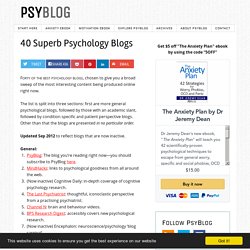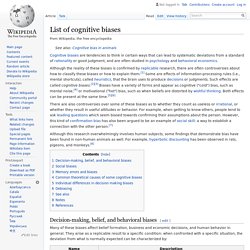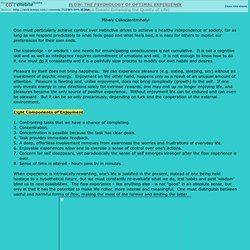

Mind. 40 Superb Psychology Blogs. Forty of the best psychology blogs, chosen to give you a broad sweep of the most interesting content being produced online right now.

The list is split into three sections: first are more general psychological blogs, followed by those with an academic slant, followed by condition specific and patient perspective blogs. Other than that the blogs are presented in no particular order. Updated Sep 2012 to reflect blogs that are now inactive. General: PsyBlog: The blog you’re reading right now—you should subscribe to PsyBlog here.MindHacks: links to psychological goodness from all around the web. More academic: Dr Petra Boynton: sex educator and academic exposes media misrepresentations of science.Babel’s Dawn: exploring the origins of language.The Neurocritic: anonymous, critical, mischievous.Advances in the History of Psychology: it’s all in the title.Deric Bounds’ MindBlog: biological view of the brain from an Emeritus Professor. Condition specific/patient perspective blogs: Panic!
List of cognitive biases. Cognitive biases are tendencies to think in certain ways that can lead to systematic deviations from a standard of rationality or good judgment, and are often studied in psychology and behavioral economics.

There are also controversies over some of these biases as to whether they count as useless or irrational, or whether they result in useful attitudes or behavior. For example, when getting to know others, people tend to ask leading questions which seem biased towards confirming their assumptions about the person. However, this kind of confirmation bias has also been argued to be an example of social skill: a way to establish a connection with the other person.[7] Although this research overwhelmingly involves human subjects, some findings that demonstrate bias have been found in non-human animals as well. For example, hyperbolic discounting has been observed in rats, pigeons, and monkeys.[8] Decision-making, belief, and behavioral biases[edit] Social biases[edit] Debiasing[edit]
FLOW: THE PSYCHOLOGY OF OPTIMAL EXPERIENCE. (Steps Toward Enhancing the Quality of Life) One must particularly achieve control over instinctive drives to achieve a healthy independence of society, for as long as we respond predictably to what feels good and what feels bad, it is easy for others to exploit our preferences for their own ends.

The knowledge - or wisdom - one needs for emancipating consciousness is not cumulative. It is not a cognitive skill and as well as intelligence requires commitment of emotions and will. It is not enough to know how to do it, one must do it consistently and it is a painfully slow process to modify our own habits and desires. Pleasure by itself does not bring happiness. Eight Components of Enjoyment 1. 2. 3. 4. 5. 6. 7. 8. When experience is intrinsically rewarding, one’s life is justified in the present, instead of one being held hostage to a hypothetical future, but we must constantly re-evaluate what we do, lest habits and past ‘wisdom’ blind us to new possibilities.
Psychology. Psychology. Neuropsychology.